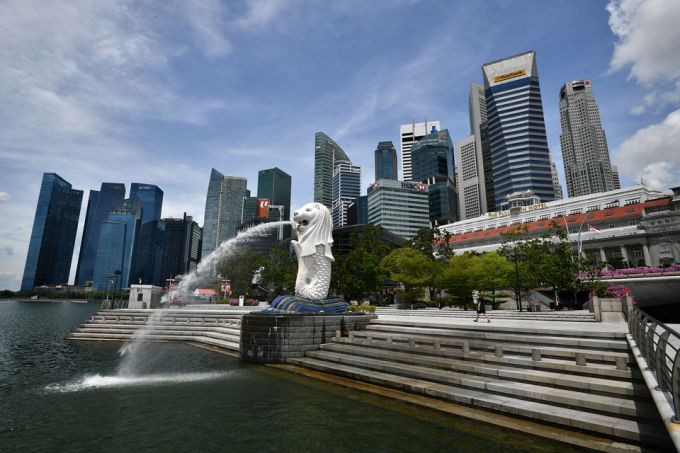AMID an improvement in business confidence, Singapore’s Grade A CBD office rentals posted their first uptick after five consecutive quarter-on-quarter drops since the Covid-19 outbreak began, going by preliminary data from JLL.
The property consulting group estimates that the average monthly gross effective rental value of its Grade A CBD office basket has risen 1.2 per cent quarter on quarter to S$9.90 psf in the second quarter of this year from S$9.79 psf in Q1 2021.
The increase follows two consecutive quarters of slowing rent correction. JLL’s rental value fell 0.2 per cent in Q1 this year and 2.7 per cent in Q4 last year. Prior to that, rents had slipped 3.8 per cent in Q3 2020 and 3.0 per cent in Q2 2020.
JLL sees the maiden uptick this quarter as a positive sign that office rents have begun to recover.
With the 0.9 per cent rise in its average Grade A CBD office rent in first-half 2021, JLL expects rents to continue to firm up in the second half, potentially culminating in a full-year gain of 2 to 3 per cent. This is amid expected healthy demand underpinned by economic recovery.
Andrew Tangye, head of office leasing and advisory at JLL Singapore, noted that 70 per cent or more of the 0.8 million sq ft of office space completing this year from new buildings such as Afro-Asia and CapitaSpring has already been taken up as of Q2 2021.
JLL Singapore’s head of research and consultancy, Tay Huey Ying, said the recent reversal in relaxation of some Covid-19 safe management measures has neither unduly rattled market confidence nor dampened occupier sentiment. Demand for office space is expected to grow on the back of global economic recovery and Singapore’s attractive offerings – including good governance, a conducive business environment and talent availability.
“While the trend towards hybrid work could see occupiers continuing to rationalise their real estate requirements, space reduction from these exercises will be disproportionate to the number of employees switching to remote working,” she predicts.
“This is because corporates will need to provide a greater variety of work points such as collaboration, socialising and focus workspaces to cater to the new role of offices. There is also a pressing need to de-densify offices in response to rising employees’ expectations for a less dense workplace of the future.”
Savills Singapore’s executive director of research and consultancy Alan Cheong noted that while right-sizing arising from the remote-work culture is a known risk for the office leasing market, mega-tech companies are still expanding. “The question is: Will occupiers in growth sectors be able to offset the shrinkage in office demand from those that are right-sizing?”
From the recent peak of S$10.81 psf in Q4 2019, JLL’s average Grade A CBD office rent eased 9.5 per cent over five quarters to Q1 2021. This is a much smaller drop compared with the 56.5 per cent slide in rent over six quarters during the Global Financial Crisis (GFC), from the all-time peak of S$15.27 psf in Q2 2008 to a trough of S$6.64 psf in Q4 2009.
On the investment sales front too, the office segment has fared relatively well this time around.
According to JLL’s figures, which cover transactions of S$5 million and above, some S$2.3 billion worth of office assets changed hands last year – 270 per cent more than the S$610.87 million during the GFC low in 2009.
Year to date, the tally stands at S$1.71 billion. In 2019, prior to the Covid outbreak, the figure was S$7.6 billion.
Ting Lim, head of capital markets for Singapore at JLL, predicts: “The affirmation that Singapore’s office rents have bottomed will likely intensify competition for asset acquisitions and drive a fresh wave of price appreciation.”
Cushman & Wakefield’s head of investor services for APAC, Dennis Yeo, said: “There are a lot of positives for investing in Singapore offices right now. There is very limited supply available for sale, whether enbloc, (buying a whole building), or quality strata space.
“Money from family offices set up here is starting to flow into the office market, fuelling demand. Yes, yields are low but so are interest rates; and these people have the cash to invest.”
JLL’s Ms Lim highlights that a key factor fuelling investor appetite in Singapore office assets is that leasing demand has become “more robust, diverse and tenacious compared to a decade ago”.
Commenting on the pick-up in leasing activity since the start of the year, Mr Tangye said interest has emanated largely from growth sectors such as technology, wealth management, family businesses and healthcare.
“The growing emphasis on sustainable workplaces and employees’ wellness and health is driving demand to the better-quality, newer and greener office assets. These are the ones leading the current rental uptrend.”
Ms Tay attributes the improvement in market sentiment and occupier confidence leading to the uptick in office rents this quarter to the “successful containment of the Covid 19 virus” which allowed the Phase 3 re-opening of Singapore’s economy in late-December, coupled with the roll-out of the vaccination programme
“This has slowed down business downsizing and emboldened some corporates to consider expansions or set up offices in Singapore.”
The Business Times

